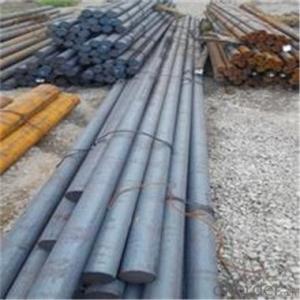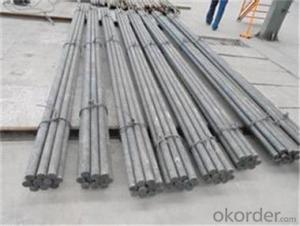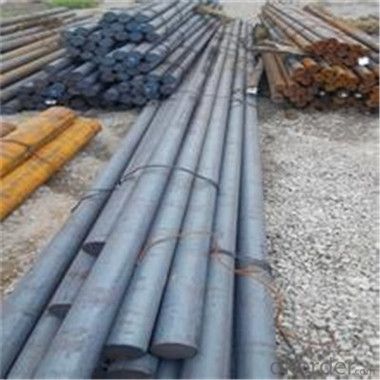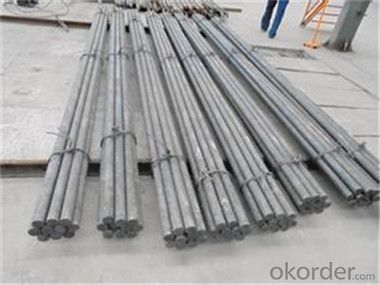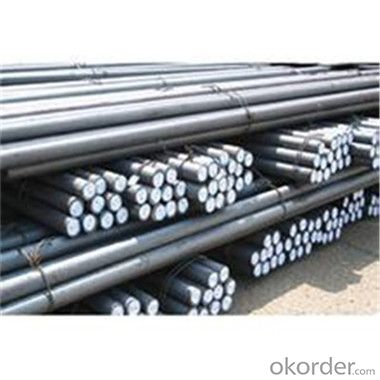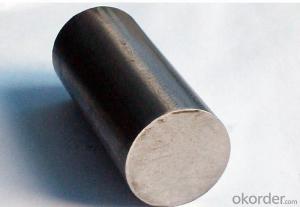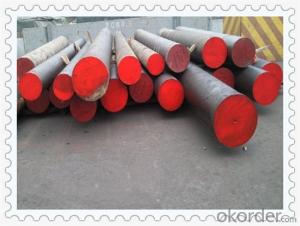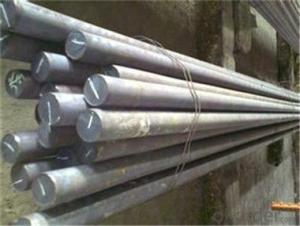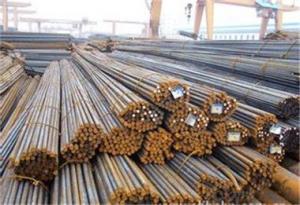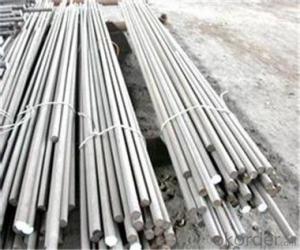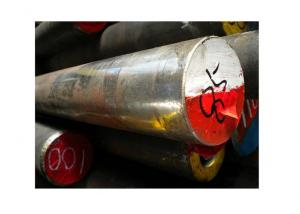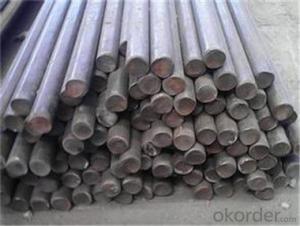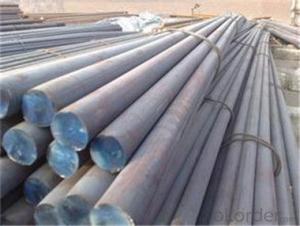Round Bar Manufacturer with Standard SKD11 High Quality
- Loading Port:
- Tianjin
- Payment Terms:
- TT OR LC
- Min Order Qty:
- 100 m.t.
- Supply Capability:
- 2000000 m.t./month
OKorder Service Pledge
OKorder Financial Service
You Might Also Like
Specification
Description of steel round bar:
(1) Thickness of not more than 2MM sheet, efficient blanking die, punch die and pressure die etc(2) All kinds of scissors, inserts, woodworking blade.
(3) Thread rolling die and wear-resistant slider.
(4) Cold Heading Die, thermosetting resin molding.
(5) Molding in deep drawing cold extrusion dies
Festures of steel round bar:
Mainly used for engineering component, forging industries, foundation bolt, shafting etc
We also stock RINL make rounds from 16mm to 80mm in all the available grades
We also take special orders in EN8, EN9 or any other equivalent grade with specific dimensional requirementsThe data given above in chart are indicative. Actual results may vary.
Specifications of steel round bar:
Description | steel round bar | |
Material | ASTM /AISI | 0,1065,1070,1080,1084 |
DIN | 5,1.7220,1.7218,1.7016,1.6523 | |
Standard | ,A575,BS970,DIN1652,JIS G4051 | |
cross section | Round Other shape:square | |
Surface | Black, galvanized,grinded,varnished,bare | |
Specifications | Round bar | Diameter: 12mm~650mm |
Angle bar | Size: 3mm*20mm*20mm | |
Square/ bar | Size: 4mm*4mm | |
Flat bar | Thickness: 2mm~100mm | |
Width:10mm~500mm | ||
Hexagonal | Size: 4mm~800mm | |
Length | Standard 6m,9m,12m or as required. | |
Trade terms | Payment terms | T/T,L/C,Western Union,negotiable etc. |
Price terms | FOB,CIF,CFR,EXW etc. | |
Applications | Hot rolled Steel round bars have a slightly grain textured finish. | |
Images of steel round bar:
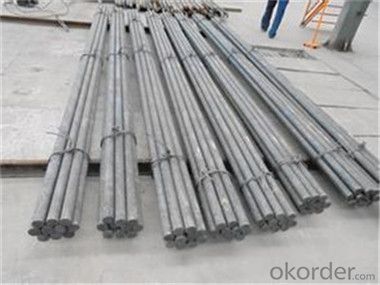
FAQ:
1. What is your package?
Packing situation: standard seaworthy packing or as customer required.
2. How long is the lead time?
Delivery time: 45 days after order confirmed.
3. What payment term do you accept?
Payment: T/T or L/C at sight.
- Q: What is the difference between a polished and a hot rolled steel round bar?
- The manufacturing processes and resulting surface finishes distinguish polished steel round bars from hot rolled ones. To produce hot rolled steel round bars, a steel billet or ingot is heated to high temperatures and then shaped into a round bar through rolling. This method yields a surface finish that is rough and uneven, with mill scale and imperfections. Hot rolled bars are typically utilized in applications where surface finish is not crucial, such as structural components, machinery parts, and construction materials. In contrast, polished steel round bars undergo additional steps to achieve a smooth and glossy surface finish. Following the hot rolling process, these bars undergo various grinding and polishing techniques to eliminate mill scale, surface imperfections, and achieve a consistent finish. The result is a refined and visually appealing surface, suitable for applications where appearance matters, such as decorative items, furniture, and architectural components. Aside from surface finish, the mechanical properties of the two types of steel round bars can also differ. Hot rolled bars tend to possess a rougher surface and may exhibit residual stresses, while polished bars feature a smoother surface and reduced internal stresses. However, the overall mechanical properties, including strength and hardness, are predominantly determined by the grade and composition of the steel used, rather than the manufacturing process or surface finish. In conclusion, the discrepancy between polished and hot rolled steel round bars lies in their surface finish. Hot rolled bars have a rough and uneven surface with mill scale and imperfections, while polished bars undergo further processing for a smooth and glossy finish. The choice between the two depends on the specific application and desired appearance of the final product.
- Q: How do you identify the grade of a steel round bar?
- The grade of a steel round bar can be identified through several methods, including visual inspection, markings on the bar, and using specialized testing equipment. Visual inspection involves examining the surface texture, color, and any visible defects or markings on the bar. Markings on the bar often indicate the grade, such as alphanumeric codes or symbols provided by the manufacturer. For accurate identification, specialized testing equipment like spectrometers or hardness testers can be used to analyze the chemical composition and mechanical properties of the steel.
- Q: What are the advantages of using non-alloy steel round bars?
- There are several advantages of using non-alloy steel round bars. Firstly, they have excellent machinability, making it easier and more efficient to shape and form them into various components. Secondly, non-alloy steel round bars offer good weldability, allowing for easy joining and fabrication. Additionally, they possess high tensile strength and hardness, making them suitable for applications that require durability and resistance to wear and tear. Furthermore, non-alloy steel round bars are cost-effective compared to alloy steels, making them a preferred choice in industries where budget is a concern.
- Q: What are the advantages of using high-temperature steel round bars?
- There are several advantages of using high-temperature steel round bars in various applications. Firstly, high-temperature steel round bars have excellent heat resistance properties, allowing them to withstand elevated temperatures without compromising their structural integrity. This makes them ideal for use in industries such as aerospace, automotive, and power generation, where components are exposed to extreme heat conditions. Another advantage of high-temperature steel round bars is their superior strength and durability. These bars are designed to withstand high mechanical stresses, making them ideal for applications that require heavy loads or intense pressure. Their high strength-to-weight ratio also allows for lighter and more efficient designs, reducing overall material and production costs. In addition, high-temperature steel round bars have excellent corrosion resistance properties. This means they can withstand exposure to harsh environments, including chemicals, moisture, and saltwater, without experiencing significant degradation. This makes them suitable for use in marine, chemical, and oil and gas industries where corrosion resistance is crucial. Furthermore, high-temperature steel round bars offer excellent dimensional stability, meaning they maintain their shape and size even under extreme temperature fluctuations. This property is highly beneficial in applications where precision and accuracy are essential, such as in machining and tooling. Lastly, high-temperature steel round bars are readily available in various sizes, grades, and finishes, allowing for flexibility and customization to meet specific project requirements. This versatility makes them suitable for a wide range of applications and ensures that there is a suitable option for every project, regardless of complexity or industry. Overall, the advantages of using high-temperature steel round bars include superior heat resistance, strength, durability, corrosion resistance, dimensional stability, and versatility. These properties make them an excellent choice for various industries and applications, ensuring reliable and long-lasting performance in demanding environments.
- Q: Can steel round bars be used in the defense industry?
- Yes, steel round bars can be used in the defense industry. Steel is a highly durable and strong material, making it suitable for various applications in the defense sector. Steel round bars can be used to manufacture components such as gun barrels, armor plates, missile casings, and other critical defense equipment. The robustness of steel ensures that these components can withstand high-stress environments and provide the necessary protection and support required in defense applications. Additionally, steel round bars can be machined, welded, or heat-treated to meet the specific requirements of different defense systems, making them an ideal material choice for the industry.
- Q: How do steel round bars perform under torsion or twisting forces?
- Steel round bars are known for their excellent performance under torsion or twisting forces. Due to their inherent strength and stiffness, steel round bars are capable of withstanding high levels of torque without significant deformation or failure. When subjected to torsion, steel round bars exhibit a phenomenon known as elastic behavior. Initially, the bar will twist and deform elastically, meaning it will return to its original shape once the twisting forces are removed. This elastic deformation is proportional to the applied torque, following Hooke's law. However, if the torsional forces exceed the elastic limit of the steel round bar, it will undergo plastic deformation. This means that the bar will permanently twist and will not return to its original shape once the forces are released. The amount of plastic deformation depends on the magnitude and duration of the torsional forces. Steel round bars are highly resistant to torsional failure due to their high tensile strength, which allows them to withstand significant twisting forces. Additionally, the smooth and uniform surface of the round bars reduces the likelihood of stress concentrations, further enhancing their torsional performance. It is important to note that the performance of steel round bars under torsion can be influenced by factors such as alloy composition, heat treatment, and manufacturing processes. By selecting suitable grades of steel and employing appropriate processing techniques, the torsional strength and performance of steel round bars can be further optimized to meet specific application requirements.
- Q: Are steel round bars suitable for marine environments?
- Yes, steel round bars can be suitable for marine environments, but it depends on the specific type of steel used and the conditions of the marine environment. Stainless steel is often the preferred choice for marine applications due to its excellent corrosion resistance properties. Stainless steel contains chromium, which forms a protective layer on the surface of the steel, preventing corrosion and rusting. However, not all steel round bars are suitable for marine environments. Carbon steel, for example, is more susceptible to corrosion in marine environments, especially in the presence of saltwater. Carbon steel should be carefully protected with coatings or treatments to prevent corrosion. Additionally, the conditions of the marine environment also play a significant role in determining the suitability of steel round bars. Factors such as the salinity of the water, exposure to chemicals, temperature variations, and physical stress can affect the corrosion resistance of steel. In highly corrosive marine environments, it is advisable to use specialized marine-grade stainless steel or other corrosion-resistant alloys. Ultimately, it is crucial to select the appropriate grade of steel and consider additional protective measures, such as coatings or galvanization, to enhance the durability and longevity of steel round bars in marine environments.
- Q: What are the advantages of using tin-alloy steel round bars?
- Tin-alloy steel round bars offer several benefits in various industries: 1. Corrosion Resistance: Due to the presence of tin, these bars have exceptional resistance to corrosion. They are suitable for industries exposed to moisture, chemicals, or harsh environments like marine, automotive, and construction. 2. Enhanced Machinability: Tin-alloy steel round bars are known for their superior machinability. The addition of tin makes them easier to cut, drill, and shape, reducing tool wear and increasing productivity during machining. 3. Strength and Durability: By alloying tin with steel, these bars become stronger and more durable. They have higher tensile strength and hardness compared to regular steel bars, making them resistant to wear, deformation, and fatigue. This ensures longevity and suitability for heavy-duty applications. 4. Efficient Heat Transfer: Tin-alloy steel round bars exhibit excellent thermal conductivity. They are ideal for applications that require efficient heat transfer, such as heat exchangers, radiators, and engine components. 5. Reduced Friction: Compared to regular steel bars, tin-alloy steel round bars have a lower friction coefficient. This makes them suitable for applications where minimizing friction is crucial, like bearings, shafts, and gears. It results in reduced energy consumption and increased operational efficiency. 6. Cost-Effective Alternative: Tin-alloy steel round bars offer a cost-effective alternative to pricier materials like stainless steel or brass. They provide similar performance characteristics at a lower price point, making them a viable choice for various applications without compromising on quality. In conclusion, the advantages of using tin-alloy steel round bars include corrosion resistance, improved machinability, strength and durability, efficient heat transfer, reduced friction, and cost-effectiveness. These properties make them versatile and reliable for diverse applications across different industries.
- Q: What is the difference between strip steel and round steel? Where are they mainly used?
- Difference between round bar and other steel bars:(1), is not the same, round shape light round, no pattern without ribs, other steel surface appearance is engraved or ribbed, cohesive force that cause steel and concrete, and the bond strength of steel and concrete in the other.(2) the composition is different. Round steel (grade a steel) belongs to ordinary low carbon steel, and most other steel bars are alloy steel.(3), the strength is not the same, low strength steel, and other steel with high strength, the diameter of the same size as compared with other steel, round steel can bear the pulling force than other reinforced small, but the plastic steel reinforced bar is stronger than the other, there is a large deformation in the break before, while the other bars in the break before the deformation is much smaller.
- Q: Can steel round bars be used in manufacturing equipment?
- Yes, steel round bars can be used in manufacturing equipment. Steel round bars are commonly used in the manufacturing industry due to their various advantageous properties. They are known for their high strength, durability, and resistance to wear and tear. These properties make steel round bars ideal for use in heavy-duty machinery and equipment. They can be used to manufacture components such as shafts, axles, pins, and gears, which are crucial for the proper functioning of machinery. Additionally, steel round bars can be easily machined, welded, and formed into various shapes, making them versatile for use in different manufacturing applications. Overall, steel round bars are a reliable and widely used material in the manufacturing industry for the construction of equipment.
Send your message to us
Round Bar Manufacturer with Standard SKD11 High Quality
- Loading Port:
- Tianjin
- Payment Terms:
- TT OR LC
- Min Order Qty:
- 100 m.t.
- Supply Capability:
- 2000000 m.t./month
OKorder Service Pledge
OKorder Financial Service
Similar products
Hot products
Hot Searches
Related keywords
